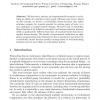Free Online Productivity Tools
i2Speak
i2Symbol
i2OCR
iTex2Img
iWeb2Print
iWeb2Shot
i2Type
iPdf2Split
iPdf2Merge
i2Bopomofo
i2Arabic
i2Style
i2Image
i2PDF
iLatex2Rtf
Sci2ools
151
click to vote
PPSN
2010
Springer
2010
Springer
Using Co-solvability to Model and Exploit Synergetic Effects in Evolution
Abstract. We introduce, analyze, and experimentally examine co-solvability, an ability of a solution to solve a pair of fitness cases (tests). Based on this concept, we devise a co-solvability fitness function that makes solutions compete for rewards granted for solving pairs of tests, in a way analogous to implicit fitness sharing. We prove that co-solvability fitness function is by definition synergistic and imposes selection pressure which is qualitatively different from that of standard fitness function or implicit fitness sharing. The results of experimental verification on eight genetic programming tasks demonstrate that evolutionary runs driven by co-solvability fitness function usually converge faster to well-performing solutions and are more likely to reach global optima.
Co-solvability Fitness Function | Distributed And Parallel Computing | PPSN 2010 | Solutions | Standard Fitness Function |
Related Content
| Added | 14 Feb 2011 |
| Updated | 14 Feb 2011 |
| Type | Journal |
| Year | 2010 |
| Where | PPSN |
| Authors | Krzysztof Krawiec, Pawel Lichocki |
Comments (0)

